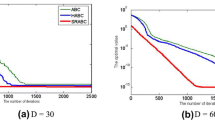Abstract
Bee-Swarm genetic algorithm based on reproducing of swarm is a novel improved genetic algorithm. Comparing to GA, there are two populations, one for global search, and another for local search. Only best one can crossover. The genetic operators include order crossover operator, adaptive mutation operator and restrain operator. The simulated annealing is also introduced to help local optimization. The method sufficiently takes the advantage of genetic algorithm such as group search and global convergence, and quick parallel search can efficiently overcome the problems of local optimization. Theoretically, the capability of finding the global optimum is proved, and a necessary and sufficient condition is obtained namely. The convergence and effective of BSGA is proved by Markov chain and genetic mechanism. Finally, several testing experiments show that the Bee-Swarm genetic algorithm is good.
Access this chapter
Tax calculation will be finalised at checkout
Purchases are for personal use only
Preview
Unable to display preview. Download preview PDF.
Similar content being viewed by others
References
Qi, R.B., Qian, F., Li, S.J., Wang, Z.L.: Chaos-Genetic Algorithm for Multiobjective Optimization. In: 6th World Congress on Intelligent Control and Automation, pp. 1563–1566. IEEE Press, Dalian (2006)
Shen, H.L., Zhang, G.L., Li, Z.T.: Adaptive genetic algorithm based on distance measurement. J. Journal of Computer Applications 27, 1967–1972 (2007)
Xing, G.H., Zhu, Q.B.: Genetic Algorithm Based on Adaptive Big Mutation Rate and Simulated Annealing and Its Application. J. Computer Engineering 31, 170–172 (2005)
Xu, H.Y., Vukovich, G.: A Fuzzy Genetic Algorithm with effective search and optimization. In: Proceedings of 1993 International Joint Conference on Neural Networks, pp. 2967–2970. Canadian Space Agency, Canada (1993)
Xiong, W.Q., Liu, M.D., Zhang, S.Y.: A Genetic Algorithm with Sex Character. J. Computer Engineering. 31, 165–166 (2005)
Joanna, L.: A multi-sexual genetic algorithm for multiobjective optimization, pp. 59–64. IEEE Press, Indianapolis (1997)
Li, Y.Z., Liu, H.X., Zhang, S.: Improving Monkey-King Genetic Algorithm. J. Journal of Nanjing Normal University. 4, 53–56 (2004)
Goldberg, D., RichardSon, J.: Genetic Algorithm with sharing for multi-modal function optimization. In: 2nd International conference on Genetic Algorithms, pp. 41–49. Massachusetts Institute of Technology, Cambridge (1987)
Wu, D., Cui, R.Y.: Bee-Swarm Genetic Algorithm. In: China Artificial Intelligence Society of the 11th National Annual Conference Proceedings, Wuhan, pp. 733–736 (2005)
Wu, D., Cui, R.Y., Cheng, N.: Improvidng bee-swarm genetic algorithm. J. Journal of Harbin institute of technology 38, 1150–1154 (2006)
Nicol, N.S., Richard, K.D.: Dynamic Parameter Encoding for Genetic Algorithm. J. Machine Learning, 1–8 (July 20, 1992)
Li, L.: Adaptive Genetic Algorithms Based on Nash Game. J. Computer Engineering and Applications. 40(33), 86–88 (2004)
Li, C.W., Ma, H., Han, Z.G.: Study on Randomness in Genetic Algorithm Evolution. J. Application Research of Computers 22, 61–63 (2005)
Zhang, J.B., Chen, B.X., Sui, G.R.: New mechanism of GA based on intelligent crossover. J. Computer Engineering and application 45, 35–37 (2009)
Fogel, D.B.: An introduction to simulated evolutionary optimization. IEEE Transaction on Neural Networks 5, 3–14 (1994)
Michlewicz, Z.: Genetic Algorithms + Data Structure = Evolution Programs. Springer, Heidelberg (1992)
Zhao, P.X., Cui, Y.Q., Liu, J.Z.: A New Hybrid Genetic Algorithm for Optimization Problems. J. Computer Engineering and Applications 40, 94–96 (2004)
Ma, H.M., Ye, C.M., Zhang, S.: Binary improved particle swarm optimization algorithm for knapsack problem. J. Journal of University of Shanghai For Science and Technology. 28, 31–34 (2006)
Jiang, L., Wu, K.: Research for 0—1 Knapsack problem in reedy algorithm. J. Computer and Data Engineer. 38, 32–33 (2007)
Ma, H.M., Ye, C.M.: Parallel Particle Swarm Optimization Algorithm Based on Cultural Evolution. J. Computer Engineering 34, 193–195 (2008)
Author information
Authors and Affiliations
Editor information
Editors and Affiliations
Rights and permissions
Copyright information
© 2010 Springer-Verlag Berlin Heidelberg
About this paper
Cite this paper
Wu, D., Cui, R., Li, C., Song, G. (2010). Mechanism and Convergence of Bee-Swarm Genetic Algorithm. In: Tan, Y., Shi, Y., Tan, K.C. (eds) Advances in Swarm Intelligence. ICSI 2010. Lecture Notes in Computer Science, vol 6145. Springer, Berlin, Heidelberg. https://doi.org/10.1007/978-3-642-13495-1_4
Download citation
DOI: https://doi.org/10.1007/978-3-642-13495-1_4
Publisher Name: Springer, Berlin, Heidelberg
Print ISBN: 978-3-642-13494-4
Online ISBN: 978-3-642-13495-1
eBook Packages: Computer ScienceComputer Science (R0)




